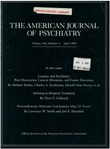Two-year longitudinal study of post-stroke mood disorders: comparison of acute-onset with delayed-onset depression
Abstract
Patients who developed post-stroke depression 3 to 24 months after hospital discharge (N = 21) were compared with patients who developed depression during hospitalization (N = 26) and patients who never developed depression over 24 months of follow-up (N = 15). During the acute hospitalization and at follow-up, the three groups were not significantly different in their demographic characteristics, neurological impairment, intellectual impairment, or quality of social support. The acute depression group, however, showed an increased correlation between impairment and depression from hospitalization to follow-up. Findings suggest that impairment does not produce depression, but, once depression occurs, it may interact with impairment to influence post-stroke recovery.
Access content
To read the fulltext, please use one of the options below to sign in or purchase access.- Personal login
- Institutional Login
- Sign in via OpenAthens
- Register for access
-
Please login/register if you wish to pair your device and check access availability.
Not a subscriber?
PsychiatryOnline subscription options offer access to the DSM-5 library, books, journals, CME, and patient resources. This all-in-one virtual library provides psychiatrists and mental health professionals with key resources for diagnosis, treatment, research, and professional development.
Need more help? PsychiatryOnline Customer Service may be reached by emailing [email protected] or by calling 800-368-5777 (in the U.S.) or 703-907-7322 (outside the U.S.).



